Gerry Adams's Blog, page 71
December 2, 2012
A Constitution for a new Republic
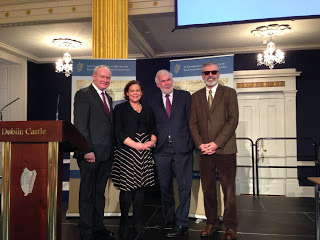 Martin McGuinness, Mary Lou McDonald, Tom Arnold, Chairperson of the Constitutional Convention and mise
Martin McGuinness, Mary Lou McDonald, Tom Arnold, Chairperson of the Constitutional Convention and mise Saturday saw the inaugural meeting of the Constitutional Convention. 100 delegates from political parties and randomly selected citizens have come together for the next year to discuss and make recommendations on changing the constitution on 8 specific areas, including Martin McGuinness and Mary Lou McDonald and I are the three representatives from Sinn Féin. Addressing the Convention I said that even “though Sinn Féin is disappointed at the way the government has limited this initiative I want to commend the Taoiseach and the Tánaiste for proceeding with it and give them fraternal notice of our intent to work with all delegates to achieve the fullest potential of this Convention.
Sinn Féin welcomes especially the adjustments at our request to the process which include the requirement that the Convention give ‘appropriate regard’ to the terms of the Good Friday Agreement.
Cuirim fáilte romhaibh uilig anseo inniu chuig an chead chruinniú den Tionol Bunreachtúil
Buíochas fosta don Justice Ó Hógáin, an tOllamh Dermot Keogh, an tOllamh David Farrell agus an Dochtúir Jane Suiter as a gcuid ionchur.
I want to commend all the participants.
I remain hopeful that the unionist parties will yet see the value of taking part.
We should continue to try and persuade them to participate.
And to those citizens who have agreed to embark on this extraordinary journey on behalf of their fellow citizens - Buíochas mór libh.
Tá sibh ag tabhairt faoi chúram agus freagracht an-mhór.
Sinn Féin welcomed the proposal to convene the Convention.
The 1937 Constitution was written in the aftermath of partition, a bloody civil war and in the context of a very different society.
It was for a state newly emerging from British colonization.
Centuries of foreign domination had almost destroyed the Irish language and culture.
Seven million of our citizens had fled overseas.
British policy ensured that the vast majority of citizens were impoverished and except for agriculture and the Lagan basin, most of the island had little industrial infrastructure.
The conflict in the north and the peace process, the enormous economic changes of recent decades, the revelations of child abuse, the diminished influence of the Catholic Hierarchy, and the disclosure of corruption in the golden circles and in politics, have also dramatically and fundamentally changed societal attitudes.
75 years after the 1937 Constitution was produced, and though Ireland is still partitioned, the Good Friday Agreement has created a new all-Ireland dynamic, all-Ireland institutions, and a new political and constitutional imperative.
Last week the Good Friday Agreement Committee, including representatives from all of the Oireachtas parties and independents, travelled to East Belfast and met with community and political leaders from loyalist working class areas.
On Wednesday another delegation of Oireachtas members visited Maghaberry prison.
Unionist leaders regularly visit Dublin.
Co-operation across this island is now commonplace.
But in the days of austerity and Troika governance citizens are asking where are our rights?
They are asking for more accountability.
More transparency.
They want equality.
Neither gender or race, age or disability, sexual orientation or class, or creed or skin colour or location should be used to deny citizens their full rights and entitlements.
The right to a job; to a home; to a decent standard of education and health, and to equality in all matters including the Irish language should be enshrined in our constitution and evident in the lives all our people.
Sinn Féin is for a constitution which reaches out to our neighbours and the children of the diaspora scattered around the globe.
Why can’t Irish passport holders in the north or the USA or Canada or Australia vote in Presidential elections?
Sinn Féin is for a constitution that also embraces all of the citizens of this island especially those who feel themselves to be British.
A constitution which builds reconciliation between Orange and Green.
A constitution that is part of shaping a new Republic for the 21st century and whick draws on best international practice.
A Republic that is democratic and inclusive and based on equality, freedom and social solidarity.
A Republic that shares its wealth more equitably, looks after its’ aged and young, provides full rights for people with disabilities, liberates women, and delivers the highest standards of public services.
The constitution of a real Republic must reflect these core values.
These are not new concepts.
Take up the Proclamation and read it.
Read too the Democratic Programme of the First Dáil.
These visionary documents contain great words.
Pursuing the happiness and prosperity of the whole nation and all its parts; guaranteeing civil and religious liberty, and equal rights and equal opportunities; and cherishing all the children of the nation equally.
And making provision for the well-being of children, so that ‘no child shall suffer hunger or cold from lack of food, clothing or shelter.’
These are words that speak to us today in a society where children and adults go hungry; half a million citizens are out of work, and emigration is thriving.
This Constitutional Convention is an opportunity to re-imagine Ireland.
To think nationally; in the real meaning of that word.
As an Irish citizen from the north I find the use of the term ‘national’ offensive when it is really being applied improperly and solely to this state.
So, let’s think beyond partition.
Let’s think of the citizens of Antrim and Down, Armagh, Derry, Fermanagh and Tyrone, as well as our other 26 counties - and our off-shore islands.
Let’s re-imagine the Ireland of the 21st century as a place where conflict and violence are in the past.
This Convention needs to think big and be prepared to act big.
Demand more time for your deliberations; open the agenda up; ensure that the Convention travels into and meet citizens from rural Ireland and the border corridor and the Gaeltacht areas and the north.
Why don’t we invite representatives from the Travelling Community to present their rightful claim to be treated as an ethnic minority?
Why should the Diaspora be limited to ‘conference calls’?
Why don’t we open up dialogue with unionism at community and civic level as well as political level?
And most importantly ensure that the Constitutional Convention is open and transparent and builds public confidence in it.
Is obair thromchúiseach tabhairt faoi phroiséis leasú bunreachtúil
Leasú a láidreoidh athmhuintearas, síochán agus rathúnas ar oileán na hÉireann agus idir ár gcuid daoine.
There is the potential to create a new Republic.
Theobald Wolfe Tone captured the spirit of this when he wrote of “a cordial union among all the people of Ireland, to maintain that balance which is essential to the preservation of our liberties and the extension of our commerce.”
Dublin Castle where we meet today used to be the centre of British power in Ireland.
It was here that James Connolly was held before being executed.
Go to the room where he was incarcerated and ponder on the mission we are embarking on today.
We know that citizens of this island deserve better than the society we have inherited.
Ireland north and south is changing.
We are an island people in transition.
For that we need a new Republic - a new constitution - that reflects our genius and diversity, our dignity and our strengths – a constitution that is inclusive and visionary.
A Constitution that belongs to all.
Go raibh maith agaibh.
Published on December 02, 2012 12:09
Killanny – A Close knit, hard working community
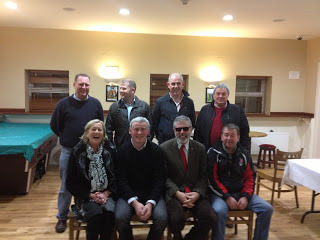 The Killanny Heritage Committee Last year the Killanny Heritage Committee held a series of talks about the history of the local area. This year the Committee decided to look outside the parish and invite a variety of speakers in to talk about different aspects of the peace process. Former Methodist Moderator Harold Goode who was one of two witnesses to the IRA’s move to put arms beyond use and Fianna Fáil adviser and politician Martin Mansergh have been speakers in this series.
The Killanny Heritage Committee Last year the Killanny Heritage Committee held a series of talks about the history of the local area. This year the Committee decided to look outside the parish and invite a variety of speakers in to talk about different aspects of the peace process. Former Methodist Moderator Harold Goode who was one of two witnesses to the IRA’s move to put arms beyond use and Fianna Fáil adviser and politician Martin Mansergh have been speakers in this series.It was my turn last Friday evening. I arrived at Killanny along with local Councillor Pearse McGeough. The two of us had just attended the turning on the of the Christmas lights in Ardee. There was a receptive crowd in the Killanny Community and Sports Centre. The parish of Killanny straddles the border between counties Monaghan and Louth. It is a beautiful place of rolling drumlin hills interspersed with small lakes. I visited the Killanny Community and Sports Centre some months ago. It is an excellent example of community power in action. Working together over several years the people of Killanny raised the money and participated in the construction of a well-designed, practical two storey building that is at the centre of the local community. Work began in 2005 and took several years but the end result is outstanding.
No one quite knows where the name Killanny comes from. It is thought it might have its origins in the name Coill Fhanaidh (the wood of the slope). Although others argue that it is more likely that it comes from an early Church settlement in the area. In the superb ‘Pictorial History of Killanny’ Terence Dooley of NUJ Maynooth’s History department in his introduction writes; ‘Cill Eanaigh (the Church of the Marsh) is one interpretation but it is more commonly believed that the name derives from Cill Eanna, the Church of St. Enda, who died in 542 and whose feast day is celebrated on March 21st each year.’The story of Ireland is reflected in the history of Killanny. From the Norman conquest, through the clan wars against the English and the agrarian conflicts. Dooley records that: ‘It was in the spring of 1816 that agitation had manifested itself in a virulent form in Killanny. Secret societies specialised in destroying houses and burning haggard of hay in an attempt to control the local economy, to keep rents at an affordable level and to prevent estate clearances at a time when one local agent believed it would not be profitable to ‘make the best rental of the estate without entirely sweeping off the present population and replacing it by real farmers’ contending that ‘an entire change of system should take place.’
After one particularly brutal attack on a wealthy local land owner in which 8 men, women and children were killed, paid infomrers led to the arrest of over 20 men, 18 of whom were executed following their trial in Dundalk. Dooley writes that ‘at least half were innocent.’Killanny also suffered from the effect of An Gorta Mór – the great hunger, emigration, economic depression and the Land War. In the early 1870’s the Marquis of Bath attempted to get his tenants to sign a covenant on their lease that would mean that in the event of their eviction they would not be compensated - as was legally required – for an improvement works they had carried out on their holdings. This led to the establishment of the Farney Tenants’ Defence Association in which Killanny tenants were prominent.
A decade later the Gaelic Athletic Association and in 1893 the Gaelic League was created to encourage the Irish language and culture. Both put down roots in Killanny. The Irish National Volunteers also attracted huge support. Killanny played its part during the Tan War and was also affected by the civil war.Agriculture was and remains the mainstay of the local economy. And Killanny GAA has a proud record of achievement.
I have thoroughly enjoyed my visits to Killanny. It is a close knit, hard working community and the people are generous and welcoming. In the course of the year they run a series of festivals and other events and recently opened the Killanny playground which I had the pleasure to try out. Don’t believe me? Look at the photos.
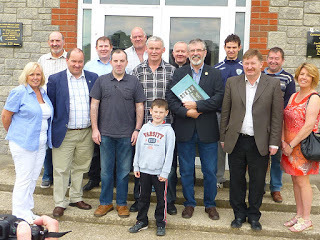
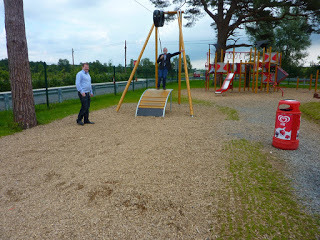
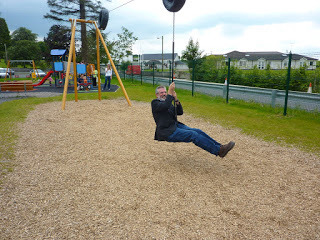
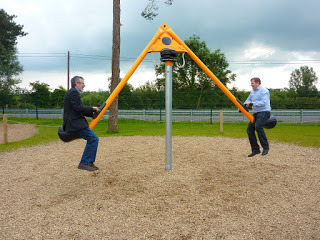
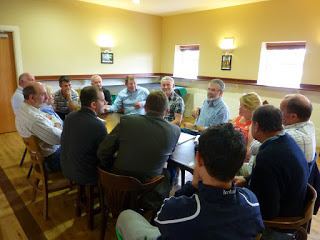
Published on December 02, 2012 08:11
November 28, 2012
The eyes have it!
The nurse was very kind. And very, very professional. I was in the Royal Hospital in Belfast. I had come directly from speaking at Fra Fox’s funeral and before that Terry Enright’s funeral. They are two of the good guys.
Anyway I was to have surgery on my eyes. For months now they have been sore. The problem is the lower eye lids were growing inwards. It’s a condition called Entropion. It’s very irritating because the lower eye lash brushes against the cornea. Sometimes this can damage your vision. So surgery was prescribed.
It’s a fairly straightforward procedure which takes a few hours. I had opted to get both eyes done in one go. The surgeon was brilliant. So were all his team. And I am very grateful to them for their professionalism, skills and generosity.
The operation sounds very gruesome. It’s carried out under local anesthetic. All the little injections around the eye really sting and smart. Essentially I suppose what happens is that the surgeon cuts into the offending eye lid or in my case eye lids, corrects the inward leaning eye lids, straightens them out and then stitches it all together again.
And then after a cup of tea and a bit of toast your out on the Falls Road again looking for the quickest way home. And then the anesthetic wears off. Your eyes go black. You hide behind dark glasses and everyone you meet makes the same joke.
‘Ah, the blues brothers!’.
Or. ‘How you Roy. It’s Roy Orbinson isn’t it?’
Or. ‘What a great Stevie Wonder impersonation.’
Or “Where did you leave the Labrador?”
But I’m glad I got it done. It was really debilitating. It was very difficult to read material or to use the computer. Your man’s typing this piece for me. That’s another challenge. He keeps telling me to stop dictating to him!
But hopefully now in a short while I’ll be back to myself.
It’s busy times here. I’m back in Dublin since Monday. The death of Savita Halappanavar in Galway University Hospital on October 28thbrought the lack of protection for pregnant women and the absence of legal clarity for the medical profession back into sharp relief. Six successive governments have failed to introduce the required legislation for 20 years.
The ‘Report of the Expert Group on the Judgement in A,B, and C v Ireland’ was published yesterday after several days of leaks to the Dublin media.
The report sets out the options for the provision of lawful termination of pregnancy in circumstances where there is a real and substantial risk to the life of the mother which can only be avoided by a termination of the pregnancy. This is the core of the matter on which the Dáil has to legislate in the immediate months ahead.
And the budget is next week. The government is poised to take €3.5 billion in cuts and new taxes out of the economy. This will be the sixth austerity budget in four years.
Increasingly the burden is being borne by lower and middle income families, by the poor, and by those most dependent on public services.
These include citizens with disabilities, the elderly, patients in our hospital system, and others who are dependent on home help support, as well as our children. There are half a million people unemployed, and tens of thousands of mainly young people scattered throughout the globe.
So, there’s a lot to be done to straighten this out. Sinn Féin has produced an alternative budget which shows that a €3.5 billion adjustment is possible without the adverse social consequences of austerity. We also produced a Jobs Plan and early next year we will bring forward proposals for dealing with the banks.
There is a compelling need to oppose austerity, to develop social solidarity and for those who can, to stand up with and for our neighbours. People are doing that in increasing numbers. There was a big anti-austerity rally in Belfast recently. And one in Dublin at the weekend. Unfortunately a silly statement from trade union leader Jack O Connor distracted attention from what was an otherwise highly successful protest.
Apparently a section of the crowd booed the ICTU President Eugene McGlone. He took it in good humour and responded accordingly. I wasn’t on the march but according to those I’ve spoken to who were, those booing included trade union members, some carrying trade union banners. Jack called them fascists. He knows better. There were no fascist protestors on the anti-austerity march. His remarks were over the top and offensive.
Many people who are annoyed at the government are particularly incensed at Labour’s role. Some see the obvious contradiction in ICTU’s opposition to austerity and its support for the Labour Party. Booing is a fairly harmless expression of this and while I don’t recommend or approve of it as a tactic, it’s hardly a mark of fascism.
I have a lot of time for Jack O Connor. I am a trade union member myself. But this is a time to stay focussed on the outrageous behavior of the Fine Gael/Labour government. It is a time to build constructive opposition to that government and to develop real alternatives.
Published on November 28, 2012 08:22
November 25, 2012
The Constitutional Convention and Border Poll
The past couple of years have been very important ones for Sinn Féin. Across the island successive elections have seen the party grow from strength to strength.
During this time Sinn Féin’s political message has been clear, coherent and consistent.
Whether in government in the north or opposition in the south it is about protecting public services and families on low and middle incomes; it is about fair taxes, investing in jobs, and growing the all-Ireland economy.
Sinn Féin is the only all-island party – a United Ireland party. Others, like Fianna Fáil, have engaged in the rhetoric of republican politics and a united Ireland for decades, but have no vision or strategies or policies to advance it.
Sinn Féin’s approach is rooted in our core republican values and our vision of a new Republic for this island. We believe in citizens and in citizens rights protected in legislation.
Partition has failed the people of Ireland, north and south, the unionists and the rest of us. A new agreed Ireland based on the rights of citizens is needed.
Constitutional Convention
On December 1st the inaugural meeting of the Irish government’s constitutional convention will take place in Dublin.
The Fine Gael/Labour approach to constitutional reform is under-ambitious and short-sighted.
Its proposals for the Constitutional Convention fall far short of the type of reform promised especially by Labour before entering government.
Despite this Sinn Féin is determined to put a number of crucial issues on the agenda at the convention, including voting rights for citizens in the North and for Irish emigrants.
During my recent visit to the USA and Canada I urged the Irish diaspora in those countries to engage with the convention and make demands of it. I also urge citizens in the north to make their voices heard on this. The Irish government is contemplating giving the vote to Irish citizens in Presidential elections outside the state but not in the north.
This is not acceptable. Only by lobbying and raising the demand for the vote will it be possible to move the convention beyond the narrow remit it has been set by the government.
A Border Poll
In the New year Sinn Féin will be launching our campaign to secure a border poll.
This is a part of the Good Friday Agreement. Responding to remarks I made in New York on this recently Nigel Dodds of the DUP said unionists had no concerns about a border poll. He actually claimed that I am "detached from reality”.
According to Nigel, "The DUP is not concerned about the likelihood of such a poll being held, nor are we worried about what the outcome would be”. His party Leader Peter Robinson echoed this at his party conference on Saturday.
Well if that is true and not just bravado then I expect to receive their support when we begin our campaign for a border poll in the new year. Let the DUP put their confidence to the test.
Under the terms of the Good Friday Agreement there is now only a qualified, conditional claim by the British on the north and this will change when a majority of citizens vote for an end to the union.
The Good Friday Agreement therefore provides for a border poll on Irish unity and Sinn Féin wants that poll held in the upcoming period.
Of course, this means building support for a poll and for a vote in favour of ending partition. I believe we can do this. The economic and political dynamic for the 21st century is for greater co-operation and harmonisation. Common sense, as well as the logic of history, advocates Irish unity.
It would reduce government costs, make for more efficient governance, create new jobs and guarantee stability and peace.
I am convinced that it is possible to persuade a majority of citizens that this is the best way forward. That equality and unity is better.
Published on November 25, 2012 05:45
November 21, 2012
A pause between wars
Nationalists and republicans familiar with the frequent bias and official and unofficial censorship that was the rule in British media coverage of the north over three decades will not have been surprised by that media’s current coverage of the Israeli assault on Gaza. The BBC has especially and justifiably come in for considerable criticism of its’ reporting.
Six years ago an independent group chaired by Quentin Thomas of the British Home Office, produced a report into the BBC’s coverage of the ‘Israeli-Palestinian conflict’. It concluded that there were ‘identifiable shortcomings, particularly in respect of gaps in coverage, analysis, context and perspective.’
The report was binned and the effect of that has been obvious in the current reportage of the violence in that region.
Palestinian citizens ‘die’. Israeli citizens are ‘killed’. Countless images are used of rockets being fired from Gaza but no comparable reports are given of the huge arsenal of weaponry, including nuclear weapons, that are available to the Israeli forces and much of which is being used against Palestinian civilians.
So let’s be clear the conflict in the middle east is not a war of equals. The Gaza Strip is a third world region, poor, under economic siege for six years and with most of its citizens living in poverty and relying on international aid.
Israel by comparison is a first world, highly developed, rich and heavily armed super-state with nuclear weapons. It’s as if Mohammed Ali at the height of his power and heavy weight champion of the world had decided to take on a teenager just learning to box. No contest.
Misinformation is also a weapon in every conflict. One example was reported in the last 48 hours by the United Nations Relief and Works Agency which looks after millions of Palestinian refugees scattered across several middle east countries.
It reported that on “17 November 2012 at 22:16, the Israeli Defense Forces tweeted from their official Twitter account (@IDFSpokesperson) a link to a video hosted on their official YouTube channel, featuring an animated film that depicts militants firing rockets from a school clearly marked with the UNRWA insignia.”
This didn’t happen. It wasn’t true. UNRWA denied the allegations and expressed concern at ‘the creation and use of footage that wrongly suggests that UNRWA is allowing its premises to be used for terrorist activities in the current conflict and the unauthorised use of its logo in computer-generated material. In a situation of conflict these allegations have potentially grave consequences. UNRWA takes with utmost seriousness the neutrality of its installations, particularly in times of heightened violence.”
It is worth noting that in the 2008-9 assault on Gaza the Israeli Army destroyed 10 schools and damaged another 204.
The overwhelming firepower of Israel is also evident in the numbers of Palestinian dead and the major physical damage being done to the infrastructure of the Gaza strip.
By Wednesday over 130 citizens of the Gaza strip had been killed. Five Israelis had also been killed. At least half of those killed in Gaza were women and children, like the Dula family. Their home was destroyed on Sunday afternoon. Nine family members, including a mother and four children were killed. In the Gaza strip at least 850 people have been wounded in the last 7 days. 260 have been children and 140 have been women.
There has been much talk of a ceasefire or truce and we must remain hopeful that one will be agreed. But the fact is that without a significant effort by the international community to create a meaningful and inclusive peace process any ceasefire will only be a pause between wars.
Real progress toward a negotiated political settlement requires an end of armed actions by all of the combatant groups. That means an end to the rocket attacks from Gaza. It also means an end to Israeli aggression and its bombardment of the Gaza Strip which has caused enormous suffering, and the lifting of the six year blockade.
The Gaza strip is in deep crisis. The future looks bleak for those living there.
A United Nations report published recently – ‘Gaza in 2020 – A liveable place?’ concluded that within a decade, ‘There will be virtually no reliable access to sources of safe drinking water, standards of healthcare and education will have continued to decline and the vision of affordable and reliable electricity for all will have become a distant memory for most.”
The report added that; ‘The already high number of poor, marginalised and food-insecure people depending on assistance will not have changed and in all likelihood will have increased.’
Currently 80% of the one and a half million people who live in the Gaza strip are dependent upon international aid. Gaza is running out of water. And with a huge proportion of young people it needs 250 additional schools now and another 190 in the next eight years. It also needs 71,000 housing units.
The UN report concludes that ‘one of the main reasons for the economy’s inability to recover to pre-2000 levels has been and is the blockade of the Gaza strip.’
The Palestinian people have been robbed of their land, imprisoned by separation walls and borders into ghettoes, and have little power or influence.
In 2009 I visited the Gaza strip and Israel. I saw for myself the impact of the Israeli attack and the enormous devastation it had wrought. I also spoke to Israeli victims of rocket attacks from Gaza.
The international experience and one of the main lessons from our peace process is clear. Refusing to engage in dialogue; demonising opponents; treating them as non-citizens; stripping them of their rights and entitlements, of their self-esteem and integrity as human beings; engaging in censorship and vilification, makes war easier and peace harder. It is an approach which will perpetuate the cycle of conflict.
A real peace process must be inclusive, based on dialogue and equality, and all sides must respect the right of citizens to elect or select their representatives. That means Hamas must be involved in the negotiations.
Published on November 21, 2012 04:04
November 14, 2012
Super storm Sandy and a Border Poll

Martin Ferris TD, Rita O Hare, Jennifer McCann MLA and mise
I was in the USA and Canada for a few days for a series of Sinn Féin events. My first stop was Manhattan.
The media images of the damage wrought on New Jersey and New York by the super storm Sandy became very real with the succession of accounts from friends of the damage they and their families had suffered.
I listened to good, solid Irish American activists, some of whom I have known over many years, and who had lost everything or whose families had suffered dramatically from the violence of Sandy.
For some their homes were gone. Others face months of major rebuilding. Many had been without power – no lighting, no heating - for over a week through bitter cold weather.
As I arrived in New York Mayor Bloomberg was urging citizens with no power to go to the shelters for heat. Another nor-wester was blowing in and the temperature was dropping. Imagine elderly people trapped in their homes at the top of tall apartment buildings with no power and no way of getting down. And thousands of utility workers, public service workers, construction workers and volunteers from the Red Cross and other organisations, desperately trying to provide hot meals to the trapped and those in need.
In some places the damage done by Sandy was apparent in the wrecked homes, or boats lying in the middle of roads or the fallen trees and flooded buildings but the invisible danger brought by the plummeting temperature was even greater.
Despite all of this and as other events were being cancelled, the Friends of Sinn Féin Committee decided to proceed with our annual New York dinner. The packed ballroom last Thursday evening was a testament to their good judgement and the loyalty and commitment of Irish America. It was a great evening made all the more memorable by the late arrival of Martin Ferris TD from the Kingdom of Kerry and Jennifer McCann, Executive Minister and MLA from west Belfast who walked into the ballroom just as I was finishing.
They received a rousing welcome and were swamped by well wishers and folks wanting to have their photos taken with them.
I spoke to many that evening and listened to their stories of devastation and loss and their determination to ensure that Sandy didn’t have the last word. One friend, Regina, who works in the New York City Comptrollers office turned up wearing a beautiful shawl over her jeans and heavy boots. She was leaving the event to go straight back to Breezy Point where over 100 homes had been destroyed in a raging fire during the storm and many other homes in this largely Irish American community were destroyed or badly damaged.
That evening and in subsequent speeches and briefings my main theme was seeking support for a border poll on ending partition and a united Ireland. I specifically urged Irish America to use its considerable influence to persuade political opinion in that country that a United Ireland is in the best strategic interests of the USA and to persuade their new President and Secretary of State to use their considerable influence with the British government to move them in that direction also.
I reminded them that the Good Friday Agreement provides for a border poll on Irish unity and I told them that Sinn Fein in the new year will commence a campaign to achieve this. The support of Irish America and Irish Canadians is very important in this.
I noticed that Nigel Dodds of the DUP was out almost immediately out of the blocks dismissing my remarks and claiming that I am "detached from reality”.
According to Nigel, "The DUP is not concerned about the likelihood of such a poll being held, nor are we worried about what the outcome would be”.
Well if that is true and not just bravado then I expect to receive Nigel’s support when we begin our campaign for a border poll in the new year. Let him put his confidence to the test.
The next day your man and I were up early to catch a packed train to Philadelphia. I was the guest speaker at the annual dinner of the Irish Society.
 The United Ireland Cup
The last leg of the journey took us in Canada. The Toronto Gaelic Athletic Association inaugural United Ireland Cup was being contested and it was my task to present the Cup, sponsored by Friends of Sinn Féin, to the winners of the competition. It was a tremendous success and I enjoyed several hours of great sport. Over 200 players and fans gathered at Polson Pier for the tournament. The winners were: Men – Connaught: Women – Canada: Co-ed Under Sixteens - the Chieftains.
The United Ireland Cup
The last leg of the journey took us in Canada. The Toronto Gaelic Athletic Association inaugural United Ireland Cup was being contested and it was my task to present the Cup, sponsored by Friends of Sinn Féin, to the winners of the competition. It was a tremendous success and I enjoyed several hours of great sport. Over 200 players and fans gathered at Polson Pier for the tournament. The winners were: Men – Connaught: Women – Canada: Co-ed Under Sixteens - the Chieftains. When it was over we have a briefing session with some senior Canadian politicians and trade unionists, including Joe Comartin MP, Olivia Chow MP, OFL President Sid Ryan, Toronto City Councillor Pam McConnell, Pickering City Councillor Kevin Ashe, former Saskatchewan Attorney General Chris Axworthy, and Carolyn Egan President of the United Steelworkers Toronto Area Council. Also at the briefing were activists from the Quebec Ireland Committee in Montreal and the Ottawa Group for the Irish Unity Pledge.
When it was over we have a briefing session with some senior Canadian politicians and trade unionists, including Joe Comartin MP, Olivia Chow MP, OFL President Sid Ryan, Toronto City Councillor Pam McConnell, Pickering City Councillor Kevin Ashe, former Saskatchewan Attorney General Chris Axworthy, and Carolyn Egan President of the United Steelworkers Toronto Area Council. Also at the briefing were activists from the Quebec Ireland Committee in Montreal and the Ottawa Group for the Irish Unity Pledge.And finally, the annual dinner was another packed affair. Over 200 people attended the event. There was also strong representation from the Gaelic Athletic Association, the Laborers International Union, the Ironworkers, and the Steelworkers.
All in all it was an eventful few days on the other side of the Atlantic speaking to friends of Ireland, as well as of Sinn Féin, and preparing the ground for the next phase in the struggle – a border poll on ending partition.
I also got to see my favourite Aunt Rita. She unfortunately isn’t well but I was delighted to spend quality time with her and my Canadian cousins. So was your man.
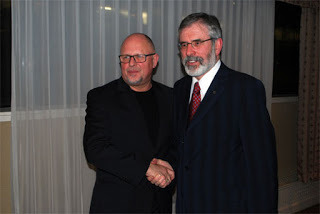


Published on November 14, 2012 11:52
November 5, 2012
Vote YES to Protect Children

The protection of children is once again a major focus of debate in the southern state because of a planned referendum on Children’s Rights that will be held this Saturday.
The referendum proposes a new Article – 42A - to the Irish Constitution and the deletion of the current Article 42.5.
In summary this referendum is about protecting the most vulnerable in society – children and young people - and ensuring that the law is shaped to protect them while imposing a legally binding duty on the state to provide the strategies, policies, services and resources needed to achieve this.
The referendum is the outworking of a debate on children’s rights in the south that goes back decades. It also reflects the concerns raised as a result of a succession of damning reports - including the Ryan Report; the Ferns, Cloyne and Murphy reports, as well as the scandal of the Magdalene Laundries - that have exposed the horrifying extent of child abuse – both physical and sexual – inflicted on children in state and Catholic Church run institutions, by clergy, and within some families.
In addition the increasing numbers of children living in poverty as a result of government policies; the 500 vulnerable young people who were recorded as homeless on census night in 2011; and the report last June by the Independent Child Death Review Group into the deaths of children in care, are disturbing examples of the failure of the existing child protection systems.
Consequently, there are some citizens who oppose this constitutional change because they do not trust the state on this issue.
There are also some who argue that the proposed constitutional change will undermine the rights of parents and of the married family.
However, if all of the reports and accounts of abuse prove anything it is that the key to successfully protecting children is early intervention. The June report from the Independent Child Death Review Group found that earlier and more consistent intervention could have helped the young people who died in care to overcome their vulnerabilities.
So, this constitutional amendment is about enshrining in the constitution the early intervention that is needed to help families and children and where practical to ensure that children remain with their parents.
It will also impose on the government the requirement that its policies and laws reflect the demands of the constitution to protect children.
The purpose of the referendum is to provide strong legislative protections for children in the time ahead and to tackle these issues in a positive way.
This is an important legislative advance and Sinn Féin welcomes it.
Sinn Féin has long campaigned for the rights of the child and this amendment is for us a first step toward incorporating the UN Convention on the rights of the Child into Irish law.
We would have preferred a stronger wording but nonetheless this is a significant step in the right direction. However, the amendment is a positive step in the right direction.
• The Constitutional Amendment as proposed expressly recognises children in their own right.
• The Amendment affirms for the first time in the Constitution that children have rights.
• The best interest of the child principle is established.
• The view (voice) of the child must be heard/taken into account in all judicial cases concerning the child’s care, adoption, guardianship, custody and access.
• The Amendment, if adopted, will allow for the first time, for the adoption of children of marital relationships, affording them full integration into a loving, supporting, family relationship.
• And finally, the Amendment upholds the constitutional protection of the traditional family construct.
Last Saturday I was in Dublin and Dundalk on the campaign trail urging a YES vote. Across the 26 counties republicans have been canvassing support for the referendum change.
The purpose of this amendment is to get the balance right for children. It is especially important for vulnerable children to ensure that all possible legal safeguards are in place to protect them. I believe this referendum is an important step in the right direction. If you have a vote on Saturday Vote Yes for Children.

Thirty-First Amendment of the Constitution
PROPOSED NEW ARTICLE 42A
Children
1. The State recognises and affirms the natural and imprescriptible rights of all children and shall, as far as practicable, by its laws protect and vindicate those rights.
2. 1° In exceptional cases, where the parents, regardless of their marital status, fail in their duty towards their children to such extent that the safety or welfare of any of their children is likely to be prejudicially affected, the State as guardian of the common good shall, by proportionate means as provided by law, endeavour to supply the place of the parents, but always with due regard for the natural and imprescriptible rights of the child. 2° Provision shall be made by law for the adoption of any child where the parents have failed for such a period of time as may be prescribed by law in their duty towards the child and where the best interests of the child so require.
3. Provision shall be made by law for the voluntary placement for adoption and the adoption of any child.
4. 1° Provision shall be made by law that in the resolution of all proceedings -
i brought by the State, as guardian of the common good, for the purpose of preventing the safety and welfare of any child from being prejudicially affected, or
ii concerning the adoption, guardianship or custody of, or access to, any child,
the best interests of the child shall be the paramount consideration.
2° Provision shall be made by law for securing, as far as practicable, that in all proceedings referred to in subsection 1° of this section in respect of any child who is capable of forming his or her own views, the views of the child shall
Published on November 05, 2012 10:46
November 3, 2012
Oireachtas na Samhna 2012
Dé hAoine bhí mé i Leitir Ceannain ag Oireachtas na Samhna.
Is ceiliúradh é an Oireachtas ar raon leathan do na healaíona dúchasacha.
Bhí lá go hiontach agam ag bualadh le cairde, comhleacaí agus cuid mhór Gaeilgeoirí.
D’úsaid Sinn Féin an seans straitéis an pháirtí agus an Gaeilge a phlé, leathanach facebook nua ‘Cabaire’ a sheoladh, agus seimineár faoi ‘Thodhchaí na Gaeilge’ a reachtáil.
Thíos seo é mo focail ag seoladh an leathanach facebook.
“Mar Éireannaigh is breá linn bheith ag caint, ag cúl chaint, agus i ndáiríre is breá linn ar fad ‘gossip’.
Mar daoine, táimid fiosrach go nádúrtha.
D’fheadfá rá gur cruthaíodh Facebook agus na meán sóisialta dúinne.
‘An Cabaire’ is ea acmhainn do na meán sóisialta.
Cruthaíodh an leathanach ‘facebook’ seo nuair a thuig Sinn Féin an luach, agus an gá a bhí ann le spás a chruthú, áit go bhfeadfadh daoine le leibhéal éagsúil Gaeilge cumarsáid agus caidreamh le daoine eile agus iad ar a gcompord le seo.
Is spás é gur féidir le daoine fail amach cad tá ar siúl, eolas a fháil faoi nuacht agus ócáidí éagsúil.
Go minic, freastalaíonn daoine ar ranganna agus teann siad go dtí an trioblóid chun an Ghaeilge a fhoghlaim, ach bíonn sé deacair orainn é a úsáid mar nach mbíonn an deis againn í úsáid gach lá, é bheith mar páirt lárnach d’ár saol.
Ach toisc gur teanga beo í An Ghaeilge, sin é go díreach an rud a chaithimid déanamh.
Seachas craic agus comhrá lenar gcairde, ár gcomleacaí agus ár gclainne, caithimid áiteanna gur féidir linn caidreamh trí Ghaeilge gach lá a aithint.
Gan dabht, táimid an-buíoch do TG4, Radio na Gaeltachta, Radio na Life agus Radio Fáilte mar aon le na gréasáin agus eagraíochtaí eile a chuir an teanga chun cinn.
Feicimid ón cuir chuige atá déanta ag Líofa sa 6 Chontae agus an éileamh atá ar níos mó seirbhísí agus Oideachas tri Ghaeilge, go bhfuil an dúil ag ár saoránaigh ár dteanga a aithint agus a úsáid.
Facebook, Twitter agus texting is ea an modh nua aimseartha chun cumarsáide.
Páistí go saolaítear anois, is féidir a rá go bhfuil féith na teicneolaíochta iontu agus iad saolaithe.
Mar sin, taispeánain leathanach facebook cosúil leis ‘An Cabaire’ nasc, ardán atá ann chun droichead a chruthú a thrasnaíonn na glúinte.
Cosúil lenár dteanga, nil aon teorann ann le facebook. Déanann sé ciall an spás seo a chruthú, áit gur cuma cé hé tú féin, cá bhfuil tú, nó fiú cén am a tá tú ann, ní gá dhuit bheith i do aonar riamh.
Aon teanga go múintear, tosaíonn sé sa bhaile.
Chruthaigh Sinn Féin post do dhuine éigin go mbeadh ábalta an Ghaeilge a fhorbairt agus a chuir chun cinn lenar bPáirtí mar thús.
Liadh Ni Riada is ea ár máthair!
Tháinig sí ar board linn i Mí Aibreán agus anois tá sí ag obair go dian chun an teanga a fhorbairt go hairithe laistigh do Shinn Féin.
Tá ranganna ag tosú anois timpeall na Tíre agus anois is féidir an Cabaire a úsáid mar acmhainn gur féidir le daoine díospóireacht, poiblíocht ar imeachtaí agus bheith i gcomhluadar a cheile.
Taispeánain sé eolas ar cad tá ar bun ag eagraíochtaí eile chomh maith, mar sin, is féidir a rá gur leathanach eolais atá ann leis.
Is féidir leat fáil amach faoi ranganna Gaeilge atá ar siúl i do cheantar féin, imeachtaí cultúrtha, gigs, gach saghas rud agus tá sé nascaithe go dtí eagrais Gaeilge eile a tá i mbun obair iontach.
Mar sin, tá sé oiriúnach a rá ‘gur ar scáth a cheile a mhaireann na daoine’ agus tá an ráiteas seo thar i bheith tráthúil chun an seoladh don leathanach nua facebook Gaeilge, go bhfuil Sinn Féin bródúil as, agus go bhfuil mórtas againn ar ,sin é gan dabht – An Cabaire”
Is ceiliúradh é an Oireachtas ar raon leathan do na healaíona dúchasacha.
Bhí lá go hiontach agam ag bualadh le cairde, comhleacaí agus cuid mhór Gaeilgeoirí.
D’úsaid Sinn Féin an seans straitéis an pháirtí agus an Gaeilge a phlé, leathanach facebook nua ‘Cabaire’ a sheoladh, agus seimineár faoi ‘Thodhchaí na Gaeilge’ a reachtáil.
Thíos seo é mo focail ag seoladh an leathanach facebook.
“Mar Éireannaigh is breá linn bheith ag caint, ag cúl chaint, agus i ndáiríre is breá linn ar fad ‘gossip’.
Mar daoine, táimid fiosrach go nádúrtha.
D’fheadfá rá gur cruthaíodh Facebook agus na meán sóisialta dúinne.
‘An Cabaire’ is ea acmhainn do na meán sóisialta.
Cruthaíodh an leathanach ‘facebook’ seo nuair a thuig Sinn Féin an luach, agus an gá a bhí ann le spás a chruthú, áit go bhfeadfadh daoine le leibhéal éagsúil Gaeilge cumarsáid agus caidreamh le daoine eile agus iad ar a gcompord le seo.
Is spás é gur féidir le daoine fail amach cad tá ar siúl, eolas a fháil faoi nuacht agus ócáidí éagsúil.
Go minic, freastalaíonn daoine ar ranganna agus teann siad go dtí an trioblóid chun an Ghaeilge a fhoghlaim, ach bíonn sé deacair orainn é a úsáid mar nach mbíonn an deis againn í úsáid gach lá, é bheith mar páirt lárnach d’ár saol.
Ach toisc gur teanga beo í An Ghaeilge, sin é go díreach an rud a chaithimid déanamh.
Seachas craic agus comhrá lenar gcairde, ár gcomleacaí agus ár gclainne, caithimid áiteanna gur féidir linn caidreamh trí Ghaeilge gach lá a aithint.
Gan dabht, táimid an-buíoch do TG4, Radio na Gaeltachta, Radio na Life agus Radio Fáilte mar aon le na gréasáin agus eagraíochtaí eile a chuir an teanga chun cinn.
Feicimid ón cuir chuige atá déanta ag Líofa sa 6 Chontae agus an éileamh atá ar níos mó seirbhísí agus Oideachas tri Ghaeilge, go bhfuil an dúil ag ár saoránaigh ár dteanga a aithint agus a úsáid.
Facebook, Twitter agus texting is ea an modh nua aimseartha chun cumarsáide.
Páistí go saolaítear anois, is féidir a rá go bhfuil féith na teicneolaíochta iontu agus iad saolaithe.
Mar sin, taispeánain leathanach facebook cosúil leis ‘An Cabaire’ nasc, ardán atá ann chun droichead a chruthú a thrasnaíonn na glúinte.
Cosúil lenár dteanga, nil aon teorann ann le facebook. Déanann sé ciall an spás seo a chruthú, áit gur cuma cé hé tú féin, cá bhfuil tú, nó fiú cén am a tá tú ann, ní gá dhuit bheith i do aonar riamh.
Aon teanga go múintear, tosaíonn sé sa bhaile.
Chruthaigh Sinn Féin post do dhuine éigin go mbeadh ábalta an Ghaeilge a fhorbairt agus a chuir chun cinn lenar bPáirtí mar thús.
Liadh Ni Riada is ea ár máthair!
Tháinig sí ar board linn i Mí Aibreán agus anois tá sí ag obair go dian chun an teanga a fhorbairt go hairithe laistigh do Shinn Féin.
Tá ranganna ag tosú anois timpeall na Tíre agus anois is féidir an Cabaire a úsáid mar acmhainn gur féidir le daoine díospóireacht, poiblíocht ar imeachtaí agus bheith i gcomhluadar a cheile.
Taispeánain sé eolas ar cad tá ar bun ag eagraíochtaí eile chomh maith, mar sin, is féidir a rá gur leathanach eolais atá ann leis.
Is féidir leat fáil amach faoi ranganna Gaeilge atá ar siúl i do cheantar féin, imeachtaí cultúrtha, gigs, gach saghas rud agus tá sé nascaithe go dtí eagrais Gaeilge eile a tá i mbun obair iontach.
Mar sin, tá sé oiriúnach a rá ‘gur ar scáth a cheile a mhaireann na daoine’ agus tá an ráiteas seo thar i bheith tráthúil chun an seoladh don leathanach nua facebook Gaeilge, go bhfuil Sinn Féin bródúil as, agus go bhfuil mórtas againn ar ,sin é gan dabht – An Cabaire”
Published on November 03, 2012 16:04
October 30, 2012
Suicide prevention must be a priority
Suicide knows no boundaries. Neither international borders or class or gender or age protect against it.
This week the Minister for Health in the Executive revealed that there have been 15 suicides in Belfast since July.
Almost every day three families on this island are faced with the devastating news that a family member has died from suicide. In some particularly harrowing circumstances this may the second or third member of a family to die in this way.
Last year 289 people died in the north from suicide. In 2009, the year for which the last full figures are available, 552 died by suicide in the south. That means by the end of this year, 2012, it is almost certain that around 900 citizens will have died by suicide.
Of the 289 who died in the north in 2011, 74 were in Belfast and 216 were male. This would appear to bear out a report in early October by the Office for Suicide Prevention in the south that men in their early 20s and women in their early 50s are at greatest risk.
The overall statistic for the north for suicide is stark and frightening. During the years 1999 to 2009, 2,258 deaths were registered as suicide. In the same period the number registered as having died by suicide in the south was 5385. That means that 7643 Irish citizens died by suicide in a ten year period.
That is a huge number but it is generally accepted that it is an underestimation of the real figures. Prof Kevin Malone of the School of Medicine and Medical Science UCD and St. Vincent’s University Hospital told the Dáil Joint Committee on Health and Children two years ago that a study he carried out into suicide in 23 countries concluded that suicide levels are significantly higher than the official statistics suggest.
International research shows that there is a clear link between areas of disadvantage, poverty and unemployment and suicide. The Minister for Health in the north has said that the death rate by suicide is twice as high in deprived areas.
A pilot study by the National Suicide Research Foundation, published several months ago, looked at 190 deaths in Cork and revealed that almost a third of the suicide victims there worked in the construction and related businesses – the sector most affected by the economic crisis.
But these are not the only causes of suicide. Last weekend 13 year old Erin Gallagher died by suicide. Erin as a second year student at Finn Valley College in Stranorlar in County Donegal, a short distance from her home.
She was the victim of on-line cyber bullying. Her death has left her family distraught and there local community in shock.
It has also frightened countless parents across the island whose children, some as young as 5 and 6, use social media sites like facebook and twitter.
Erin was the second victim of cyber bullies in recent weeks in the south. Another young teenager, 15 year old Ciara Pugsley from Dromahair in county Leitrim took her life in September.
Console which is a state wide suicide prevention agency in the 26 counties has asked anyone affected by these tragedies or who feel vulnerable to contact the service’s 24-hour helpline at freephone 1800 201 890 or access the charity’s services by texting ‘HELP’ to 51444, or at its website: www.console.ie.
There are also many agencies in the north working on suicide prevention, including Lifeline on 08088088000 and the Samaritans on 08457909090 .
The big question is what to do about suicide? There is an abundance of research available – but more is needed. There are resources being made accessible by the governments for counselling services for those at risk as well as for bereaved families. But again more is needed. Too often it has been the bereaved families who have had to take the lead on organising and campaigning.
Last week the head of one suicide prevention agency in the south, Noel Smyth of Turn the Tide of Suicide criticised the government for failing to properly resource mental health services.
Given that three times more citizens die from suicide than are killed on the roads in the south annually Smyth urged the government to establish a Suicide Prevention Agency similar to the Road Safety Authority.
I believe that in these difficult financial times when there is less money available it makes sense to co-ordinate mental health and suicide prevention services across the island. It also makes sense in terms of targeting the worst effected areas and making best use of available resources, experience and personnel.
Published on October 30, 2012 09:02
October 25, 2012
Government’s Economic Strategy failing citizens
Yesterday and today there have been Statements on the Economy in the Dáil. It is a device which is used occasionally to allow the Dáil parties and members to speak on an issue of concern.
I had ten minutes early this afternoon to make my contribution:
"Last month the Central Statistics Office produced new emigration figures for this state which revealed that 87,000 people had moved to Australia and Canada and other far corners of the globe.
The reason?
There is no work at home.
Currently 435,000 citizens are on the live register. That’s 14.8%. And government policies are making the situation worse – not better.
In my own constituency of Louth 17,293 were on the Live Register at the end of September.
These figures have remained stubbornly consistent in the 18 months the Government has been in office.
The only thing that has prevented these figures increasing has been the old social safety valve of emigration.
In addition thousands of home owners are trapped in negative equity; poverty is increasing and government debt now stands at €169 billion or 120% of GDP.
That’s a completely unsustainable level despite the Taoiseach’s reluctance to admit this.
Fine Gael and Labour are committed to an austerity strategy which is pushing up unemployment and driving down the quality of life of families.
The Government have slavishly followed the programme of austerity and cuts which was set out by Fianna Fáil in their Four Year Plan in November 2010.
Domestic Demand is on the floor as a result of the introduction of a succession of punitive measures that have reduced wages, child benefit payments, disability payments and social welfare; and attacked social provisions for carers, older citizens, and the blind.
In addition a range of stealth taxes, including the Household charge; the universal social charge; VAT increases; septic tank charges and more have eaten dramatically into the incomes of families.
There are dreadful social consequences as well as economic consequences to the Government’s austerity programme.
The elderly have been hard hit by this Government through the closure of public nursing homes and the slashing of Home Help Hours.
There is an 80 year old partially sighted woman living just outside Drogheda who recently had a hip replacement operation.
Consequently she has limited mobility.
The Health Service Executive allocated her a home help package of 30 minutes a week!
Last Thursday I met with older citizens outside the Dáil who were there with the group ‘Older & Bolder’, which is an NGO committed to defending the rights of the elderly.
They were lobbying for the immediate reversal of government cuts to Home Help and Home Care Packages.
Many of those participating were older citizens dependent on their home help service and worried and angry and distressed at the government’s plans.
Austerity is not working. Even the International Monetary Fund (IMF) have realised this.
When will the Government?
Sinn Fein has consistently said that you cannot cut your way out of recession.
Next month we will bring forward our own fully costed alternative Budget setting out our view of how the deficit should be closed as we have done in each year since this crisis began.
Sinn Fein has also produced an alternative jobs creation strategy which I have sent to the Taoiseach.
This detailed plan will provide a socially responsible way to reduce the budget deficit while creating and retaining jobs.
It calls for an investment of €13 billion into job creation and retention, which will create an average of 156,000 short and long term jobs.
The money is there; in the National Pension Reserve Fund, the European Pension Bank and in the private pension sector.
This is not rocket science.
Our stimulus plan contains:
- Plans to build an additional 100 schools and refurbish 75 more over the next three years (€350 million);
- establish 50 new Primary Health Care Centres (€250 million);
- and develop an €1billion investment in sustainable wind power and wave energy.
We have a plan to Invest in the rollout of next generation broadband across the 26 counties. (€2.5 billion)
This is vital to attract business into our communities.
In my own constituency of Louth there are rural parts of the constituency where there is no access to broadband.
This state ranks 17 out of 27 on the European league table of broad band access so we have some ground to make up in this regard.
These and other projects are set out in detail in the document and I invite the Government to take on board out ideas.
Politics is about choices.
Rather than invest money in jobs stimulus the Government have instead frittered away the money that was in the National Pension Reserve into Bank Bailouts and payments to unguaranteed bondholders.
Fine Gael and Labour have shown no strategic vision of how to invest the money in the NPRF in a way that can help the economy in the long term.
The Government record on Jobs, like that of Fianna Fáil before them is appalling.
Fine Gael’s manifesto promised that their NewERA plan would invest an extra €7 billion in energy, communications and water to give Ireland the world class infrastructure
There was to be a Jobs Budget within 100 days of the Government being established but this was watered down to a Jobs initiative in May 2011.
In February of 2012, after a year in office the Government unveiled an Action Plan for Jobs.
At its launch the Taoiseach said it would create an additional 100,000 jobs.
There has been a loss of 33,000 in the last year.
The Labour Party promised before the election that it would put in place a €500 million jobs fund to support new ideas and create employment in strategic sectors of the economy.
They promised to establish a strategic investment bank, with a lending capacity of €2 billion, from the National Pension Reserve Fund.
None of this happened. And then there was the Strategic Investment Fund unveiled in September 2011.
It was to provide funds from the National Pension Reserve Fund for investment in the economy, provide capital for small and medium enterprises and the creation of jobs.
The legislation required for the Fund hasn’t been published and the Government haven’t been able to give any indication as to when this would be brought forward.
The Government have failed to deliver the promised 60,000 additional places for Education and Training.
The Government is on the wrong track, its continuing the failed policies of Fianna Fáil.
I encourage the Government to look at seriously at the alternatives that Sinn Fein have set out in our Jobs Proposals and which we will set out in our alternative budget.
Published on October 25, 2012 05:42
Gerry Adams's Blog
- Gerry Adams's profile
- 29 followers
Gerry Adams isn't a Goodreads Author
(yet),
but they
do have a blog,
so here are some recent posts imported from
their feed.



